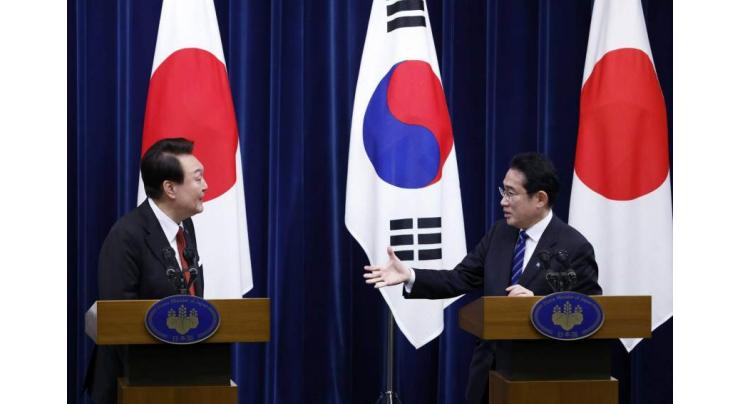
South Korea Displeased With Japanese Media Coverage Of Yoon-Kishida Summit - Official
Faizan Hashmi Published March 20, 2023 | 07:29 PM

Seoul has expressed dissatisfaction with the way Japanese media covered South Korean President Yoon Suk-yeol's recent meeting with Japanese Prime Minister Fumio Kishida in Tokyo, where the two leaders agreed to normalize relations and restart strategic dialogue at various levels, a presidential official said on Monday
MOSCOW (UrduPoint News / Sputnik - 20th March, 2023) Seoul has expressed dissatisfaction with the way Japanese media covered South Korean President Yoon Suk-yeol's recent meeting with Japanese Prime Minister Fumio Kishida in Tokyo, where the two leaders agreed to normalize relations and restart strategic dialogue at various levels, a presidential official said on Monday.
Following the talks last week, Japanese newspaper Sankei Shimbun reported that Kishida had urged Yoon to lift restrictions on imports of seafood and implement the 2015 deal on the resolution of the "comfort women" issue. Other Japanese media outlets reported that Kishida had also raised the issue of sovereignty over the disputed islands of Dokdo/Takeshima, also known as the Liancourt Rocks.
"With regard to the completely groundless or distorted reports coming out of Japan after the summit, I understand that our diplomatic authorities have expressed regret and asked for a prevention of a recurrence," the South Korean presidential official was quoted by the Yonhap news agency as saying.
Neither the "comfort women" issue, nor the Dokdo Islands were discussed at the meeting between Kishida and Yoon, the official said, adding that other details of the leaders' discussions could not be disclosed.
The "comfort women" system was set up by the Japanese imperial forces in occupied countries, including South Korea, during Tokyo's colonial rule, which lasted from 1910-1945 over the Korean Peninsula. Under the scheme, up to 200,000 young women and girls were sexually enslaved for the military. The issue remains a stumbling block in relations between Tokyo and Seoul together with the Liancourt Rocks, to which both sides claim to have long-standing historical ties.
Related Topics
Recent Stories

Pakistan's geostrategic location offers ideal trade, transit hub for SCO region: ..

IHC Justice Kayani emphasizes upon clear role of agencies

The President of Turkmenistan and the National Leader of the Turkmen People Sent ..

Vivo V30e 5G Launched in Pakistan with Sleek Design and Advanced Imaging Capabil ..

Pakistan Railways announces over 50pc cut in train fares

Tickets sale for fans zones in Australia for Pak-India match to start on June 4

LHC grants bail to Chaudhary Parvez Elahi

Two underpasses to be built in Islamabad: Mohsin Naqvi

One-day Mourning in Pakistan today for Iranian helicopter crash victims

Currency Rate In Pakistan - Dollar, Euro, Pound, Riyal Rates On 21 May 2024

Today Gold Rate in Pakistan 21 May 2024

PTI founder acquitted in May 9 vandalism case
More Stories From World
-
Hazardous weather causes Giro 16th stage to be shortened
5 minutes ago -
Greek court drops charges in migrant shipwreck case
15 minutes ago -
One death, injuries after 'severe turbulence' on Boeing plane: Singapore Airlines
35 minutes ago -
Jeddah: Salik praises Saudi Arabia for exemplary Hajj arrangements
35 minutes ago -
German prince on trial in far-right coup plot
45 minutes ago -
Strike over Olympics bonuses disrupts Paris trains
55 minutes ago
-

The President of Turkmenistan and the National Leader of the Turkmen People Sent Condolences to the ..
1 hour ago -
New Caledonia tourists 'ecstatic' as rescue planes arrive
1 hour ago -
Ukrainian attacks kill three in Russia, eastern Ukraine
1 hour ago -
16 top AI firms make new safety commitments at Seoul summit: UK govt
2 hours ago -
Syria first lady diagnosed with leukaemia: presidency
2 hours ago -
First tourists evacuated from riot-scarred New Caledonia
2 hours ago
